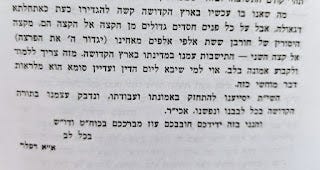Did NOTHING happen?!
Yom Ha-Atzmaut is a national holiday in Israel. Schools are off, businesses are closed. For those who celebrate Yom Ha-Atzmaut, this means (if you are religious) davenning a special festive prayer of thankfulness in shul. This is followed by celebrating the land by going out into it (i.e. into the countryside) for a festive meal. (If you want to read a bizarre interview with a left-wing Israeli academic about the "symbolism" of the barbeque, check out this article at the Times of Israel.)

But what about for charedim who don't celebrate Yom Ha-Atzma'ut? Those in the working world, which means especially Anglos, nevertheless have a day off work. What will they do with this day?
One local shul in Ramat Beit Shemesh sought to take advantage of this for a Yom Iyun. "Transform your Yom HaAtzmaut Day Off into a Day of Torah Learning!" It featured four speakers - not only the rabbi of the shul and other locals, but also the popular Rabbi Dovid Kaplan from Ohr Somayach.
In theory, that's a very fine thing to do; it's something that other non-Zionist shuls in the neighborhood have done in the past. You can have all kinds of shiurim about the sanctity and special nature of Eretz Yisrael and its role in our history and even about how fortunate we are to be back in it, which don't get into the "problematic" topic of Zionism.
Except that's not what the shiurim were about.
One was about Genevas Daas; one was about Sefiras Ha-Omer; one was about the "Seventh Heaven"' and one was about "How to Love Your Friend."
What?!
The single greatest miracle since Biblical times, the return of the Jewish People from exile to sovereignty in our ancient homeland, and you have nothing to say about it?!
You're already organizing a Yom Iyun on the day. Talk about the miracle. Talk about how the prophecies in the Torah were at least partially fulfilled. Talk about how the UN, that great enemy of the Jews, and even Russia, supported it. Even talk about whether or not it can be declared religious significant, giving both sides of the argument. But talk about something!
Heck, I think I might even understand the Satmar approach, of mourning the establishment of Israel as the Work of Satan, better than this. At least they recognize that something happened!
And if you think that only a Zionist would protest the lack of acknowledgement of the significance of the day, think again. Read the following extract from a letter from none other than Rav Dessler:
Regarding that which we are now in the Holy Land - it is difficult to describe it at present as the beginning of the Redemption. But in any case it is certainly a great kindness from one extreme to another - from the extreme of the suffering of the destruction of six million of our brethren (may God repair the breach) to the other extreme - the settlement of our nation in the Holy Land. From this, we need to learn and establish emunah in our hearts; woe to the one who comes tot he Day of Judgement and is still blind from perceiving this tangible reality. (Michtav Me-Eliyahu vol. III, p. 352)

Even the Edah Charedis was once open to acknowledging the obvious. In 1918, to mark the first anniversary of the liberation of Jerusalem from the Turks by the British, they issued the proclamation that you can see in this picture. They called on all the shuls and yeshivos "to thank Hashem for the redemption, and the salvation," and to say the prayer of Hanosen teshuah on behalf of "George the Fifth, yarum hodo (may his glory be increased)" and a misheberach for General Allenby.
Even if you think that the anti-religious nature of many Zionists, and the lack of perfection of the State of Israel, means that its founding cannot be celebrated as a religious event, how can anyone simply ignore the historical significance of it?!
For a fuller discussion of the theological significance of the establishment of the State of Israel, which do not require one to be a "Zionist," see the various essays in the excellent Koren Yom Ha-Atzmaut Machzor - in particular, Rav Soloveitchik's "Six Knocks."



